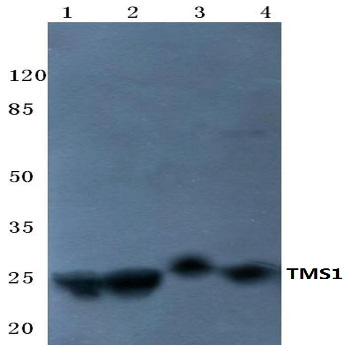TMS1 (PYCARD) Rabbit Polyclonal Antibody
Other products for "PYCARD"
Specifications
| Product Data | |
| Applications | IF, IHC, WB |
| Recommended Dilution | Western Blot: 1/500-1/1000. Immunofluorescence: 1/50-1/200. Immunohistochemistry on Paraffin Sections: 1/50-1/200. |
| Reactivities | Human, Mouse, Rat |
| Host | Rabbit |
| Clonality | Polyclonal |
| Immunogen | Synthetic peptide, corresponding to the N-terminual of Human TMS1. |
| Specificity | This antibody detects endogenous levels of ASC protein. (region surrounding Glu13) |
| Formulation | PBS, pH~7.2 State: Aff - Purified State: Liquid purified Ig fraction (> 95% pure by SDS-PAGE); 50% glycerol Preservative: 0.02% Sodium Azide |
| Concentration | 1.0 mg/ml |
| Purification | Affinity Chromatography using epitope-specific immunogen |
| Conjugation | Unconjugated |
| Storage | Store undiluted at 2-8°C for one month or (in aliquots) at -20°C for longer. Avoid repeated freezing and thawing. |
| Stability | Shelf life: One year from despatch. |
| Predicted Protein Size | ~22 kDa |
| Gene Name | PYD and CARD domain containing |
| Database Link | |
| Background | Caspase-associated recruitment domains (CARDs) mediate the interaction between adaptor proteins such as APAF1 and the proform of caspases (e.g. CASP9) participating in apoptosis. ASC (apoptosis-associated speck-like protein containing a CARD, also known as TMS1or PYCARD) is a member of the CARD-containing adaptor protein family. ASC is a 195 amino acid protein that contains an N-terminal pyrin-like domain (PYD) and an 87 residue C-terminal CARD. This motif is characteristic of numerous proteins involved in apoptotic signaling. Fluorescence microscopy demonstrates a ring-like expression in some transfected cells. Immunofluorescence microscopy demonstrates that induction of apoptosis causes a CARD-dependent shift from diffuse cytoplasmic expression to punctate or spherical perinuclear aggregates. Western blot analysis shows expression of 22 kDa ASC in leukemia and melanoma cell lines. ASC exhibits intriguing behavior by forming an aggregate and appearing as a speck during apoptosis induced by retinoic acid and other anti-tumor drugs. The ASC gene maps to human chromosome 16p12-p11.2. |
| Synonyms | TMS1 |
| Reference Data | |
Documents
| Product Manuals |
| FAQs |
| SDS |
{0} Product Review(s)
0 Product Review(s)
Submit review
Be the first one to submit a review
Product Citations
*Delivery time may vary from web posted schedule. Occasional delays may occur due to unforeseen
complexities in the preparation of your product. International customers may expect an additional 1-2 weeks
in shipping.






























































































































































































































































 Germany
Germany
 Japan
Japan
 United Kingdom
United Kingdom
 China
China




